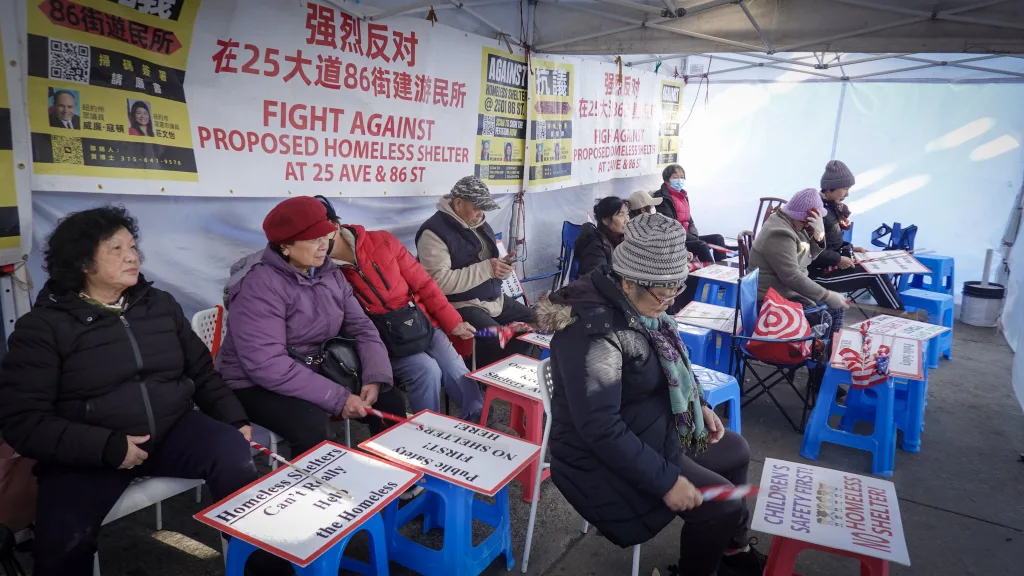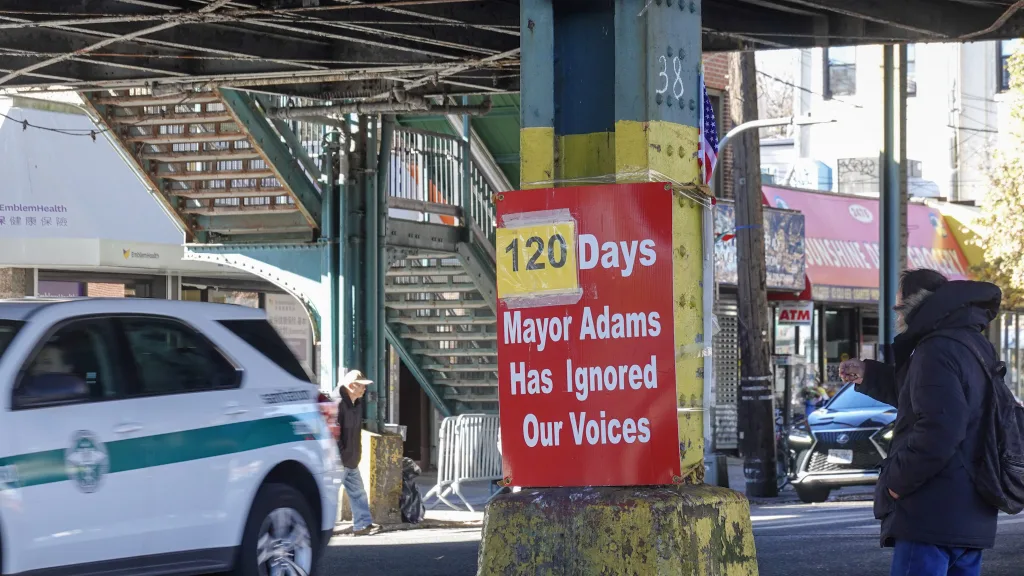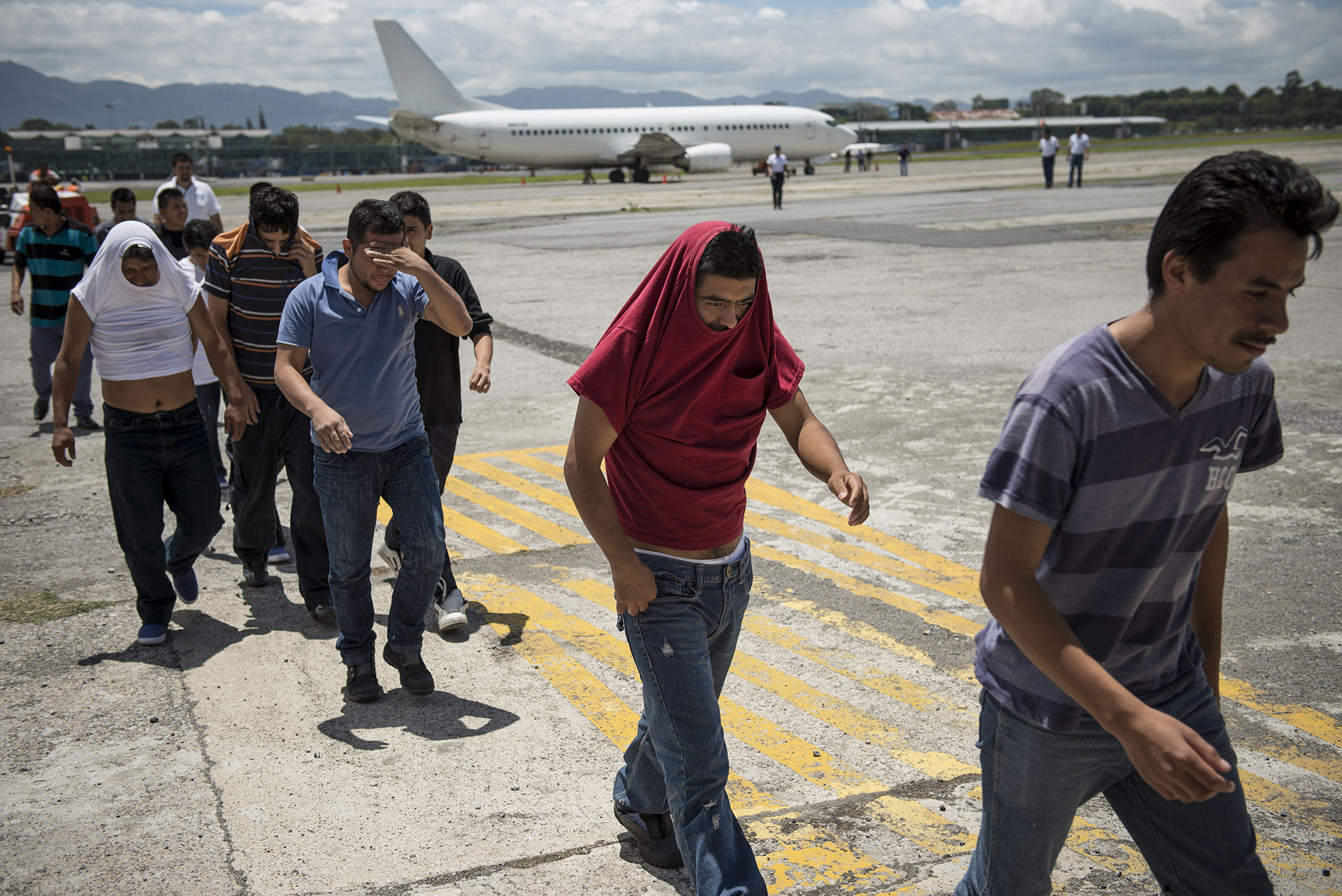Forty-nine-year-old L. Yuan, a Democrat from Gravesend, had never closely followed state Senate races in her district. However, when the city proposed a homeless shelter in her neighborhood, she was motivated to head to the polls. In the race for the 17th State Senate District seat, she cast her vote for a fervent opponent of the shelter, Republican Steve Chan.
The morning after the election, news of Chan’s decisive victory quickly spread through several WeChat groups, which included Chinese residents from South Brooklyn who had voiced their concerns about the shelter. Chan, a Chinese American Republican, won by a wide margin, defeating the incumbent Chinese Democratic Senator Iwen Chu by more than 5,000 votes. With this victory, he became the first Chinese American Republican elected to the New York State Senate, reflecting the red shifts seen in many neighborhoods across the city this year compared to 2020.
“I’m not surprised at all by Steve Chan’s victory,” said long-time Brooklyn community activist Sam Ni. “His yard signs were everywhere.”
Yuan’s decision to vote for Chan was mirrored by her parents and in-laws, who also chose him on their ballots. Remarkably, it was the first time Yuan’s parents and in-laws had voted since becoming U.S. citizens over 40 years ago.
Ni pointed out that Chan, despite being a political newcomer, established deep roots in the Brooklyn community. He also noted the stark contrast between Chan’s clear opposition to the homeless shelter and incumbent Senator Chu’s approach, which he described as a more passive, reactive strategy “driven by the chaotic and uncertain circumstances.”
Also Read: Chinatown Organizations Protest Proposed Homeless Shelter
“One firmly stands with the community, protesting alongside them every day, while the other muddles through under pressure,” Ni said, adding that it was “easy for voters to make a decision” based on the candidates’ stance on the proposed homeless shelter near 86th Street and 25th Avenue, which could house 150 single male adults. Opponents have said the proposed shelter could house individuals with mental health issues, potentially affecting the safety of the neighborhood.

According to his campaign website, Chan and his parents moved to New York from Hong Kong when he was 11. He has lived in Bensonhurst since 1992. A retired U.S. Marine and former New York City Police Department officer, Chan also served as a PTA president and member of the School Leadership Team. More recently, he became a frequent presence at protests against the construction of the homeless shelter on 86th Street.
Speaking to Documented, Chan credits his victory to his strong community ties and personal engagement with voters on key issues such as public safety, the influx of migrants and quality of life. “A lot of these homeless people are criminals the Democrats have let out of jail over the last five years through bail reform,” Chan alleged. “None of this makes sense to us as neighbors. We don’t want this. We stand against it.”
He cited an incident of a homeless man who fatally stabbed three people Monday in Manhattan. “This is exactly the type of person we’re trying to keep out of our backyards, our businesses, near our schools, and at subway entrances.”
Also Read: Chinese Community Marches to Tell Adams: “Our Voice and Vote Matters”
Many residents have cited public safety as a concern since last year in November, when they first learned about the plan for the shelter. A series of large protests followed along with a petition against the shelter, which gathered over 33,000 signatures. On July 17, protests over the homeless shelter in Bensonhurst escalated into clashes between police and protesters, prompting many Chinese community members to recognize the necessity of greater political engagement and shifting from a “street revolution” to a “parliamentary revolution,” according to Ni. Democratic Councilmember Susan Zhuang, who was later heralded as a hero after biting a cop that day, reportedly registered around 3,000 new voters in just three months, and their political demands translated into ballots in the election.

“It’s a battle between two political ideologies”
Yuan echoed Ni’s observation of incumbent Senator Chu, saying she responded “slowly” to concerns about the shelter. She recalled an instance where the community had organized a small-scale protest as early as November last year. While other local elected officials attended, Chu was absent. Yuan said Chu only directly addressed the issue after tensions escalated into the large-scale demonstration on July 17. “Iwen Chu’s attempt to suppress public opinion amidst widespread anger was a thankless effort; she underestimated the depth of public frustration,” said Ni.
According to Yuan, Chu’s initial statement, describing the protest as an “illegal rally” because there was no permit from the NYPD, further fueled public anger and frustration, despite being factually accurate. Although Chu later took some measures to make amends to address the controversy surrounding the homeless shelter, many voters remained unconvinced. Meanwhile, Chan frequently appeared at protests alongside other politicians, gradually gaining favor among Chinese voters.
The frustration over the shelter led Jacky Wong, the managing director of the Greater Chinatown Civic Coalition, to also support Chan’s campaign. The coalition has long opposed the construction of “excessive” homeless shelters and has organized multiple rallies in Manhattan’s Chinatown. Still, he said their efforts have achieved limited success. Chan’s victory speaks to a broader national trend of red waves with South Brooklyn voters targeting Chu not because of who she is personally, but because she represents the Democratic machine, Wong said. “The results of the election is a direct indictment of the establishment, an indictment of the Democrats,” said Wong. “Voters used their ballots to voice their frustration over long-standing concerns that have been ignored or unresolved.”
Wong called the Democratic Party an “elite-driven party” and added that the party has become increasingly disconnected from the everyday concerns of grassroots communities. Unable to address pressing issues such as public safety and immigration, the party has focused instead on identity politics — such as gender and race — to rally support, said Wong.
“This election, including the 17th State Senate District race, reflects a growing rejection of identity politics among voters,” Wong said. “It’s a rebellion by minority communities against the Democratic Party.”
For many in the community, this year’s election marked the increasing evolution of Chinese voters, who are becoming more focused on issues rather than party affiliations.
Also Read: Councilmember Accused of Biting Cop Heralded in Bensonhurst as a Hero
Ni noted that in 2022, many Chinese voters supported Iwen Chu based on her identity as a Chinese American, hoping to mark another milestone in Chinese political representation, but this year was different, he said. “This isn’t a battle between Chan and Chu — it’s a battle between two political ideologies.” According to Ni, in the 2024 race, with both candidates being Chinese, voters focused more on which candidate’s policies aligned with their concerns. Yuan echoed Ni’s sentiments. “Many voters, including myself, no longer rely on party lines to choose candidates, but instead, we ‘choose people, not parties,’ ” said Yuan.
Chu attributed the election results to broader political dynamics rather than a single issue like the proposed homeless shelter, adding that her team is still analyzing data to identify the causes and factors behind the election outcome. “With presidential candidates on the ticket, there’s a downballot effect,” she told Documented, explaining that initial data suggested many Democrats might have stayed home.
Chu emphasized her commitment to addressing the shelter issue “within the system.”
“The shelter is a city issue, and we’re trying to find a mechanism for the city to respond to the community,” she said. However, Chu expressed frustration, noting that despite pushing for answers from the start, the city failed to provide concrete responses until tensions between protesters and police escalated on July 17, drawing media attention. “We’ve been asking — it’s not like we delayed it,” Chu said.
A New Political Alliance
South Brooklyn’s Chinese community has been shifting toward the right politically for some time. After the recent redistricting of both state and city legislative districts, new majority and plurality Asian districts have emerged, becoming a key battleground for different political factions and a platform for Asians to assert their political influence.
In 2022, Republican Assemblymember Lester Chang unseated longtime Democratic Assemblyman Peter Abbate in Assembly District 49. The following year, Zhuang, a moderate Democrat and former chief of staff to Assemblyman William Colton, was elected as a councilwoman in District 43. Zhuang reportedly told a voter that she aligns with “the ideas of the Republican Party.” Their victories reflect the growing trend of political realignment within the community.
These new leaders are focusing on critical issues important to the Chinese community, such as public safety and education. Amid the ongoing immigration concerns, the homeless shelter emerged as a central campaign issue, with many of their constituents viewing it as a potential source of crimes and a threat to the neighborhood’s quality of life.
While Chu, former chief of staff to Assemblyman Abbate, won the election in 2022, her political differences with figures like Councilmember Zhuang and Assemblymember Colton, as well as the long-standing feud between her former boss Peter Abbate and Colton, have limited her ability to collaborate on key issues affecting the community.
Chan’s victory represents a shift in South Brooklyn’s political power structure and the formation of new alliances. Though from a different party than Councilmember Zhuang and Assemblymember Colton, Chan has repeatedly aligned with them and their strategies — and with Assemblymember Chang — on important local issues for Chinese community members, including opposing the homeless shelter, maintaining specialized high school exams and G&T programs.
“I believe with Steve Chan in office, Southern Brooklyn will become a more unified political force, leaving little opportunity for other politicians,” said Wong.
For many in South Brooklyn’s Chinese community, Chan’s win represents a victory of the people’s voice. “Now we’re all speaking out,” Yuan said, “and we have a voice.”














